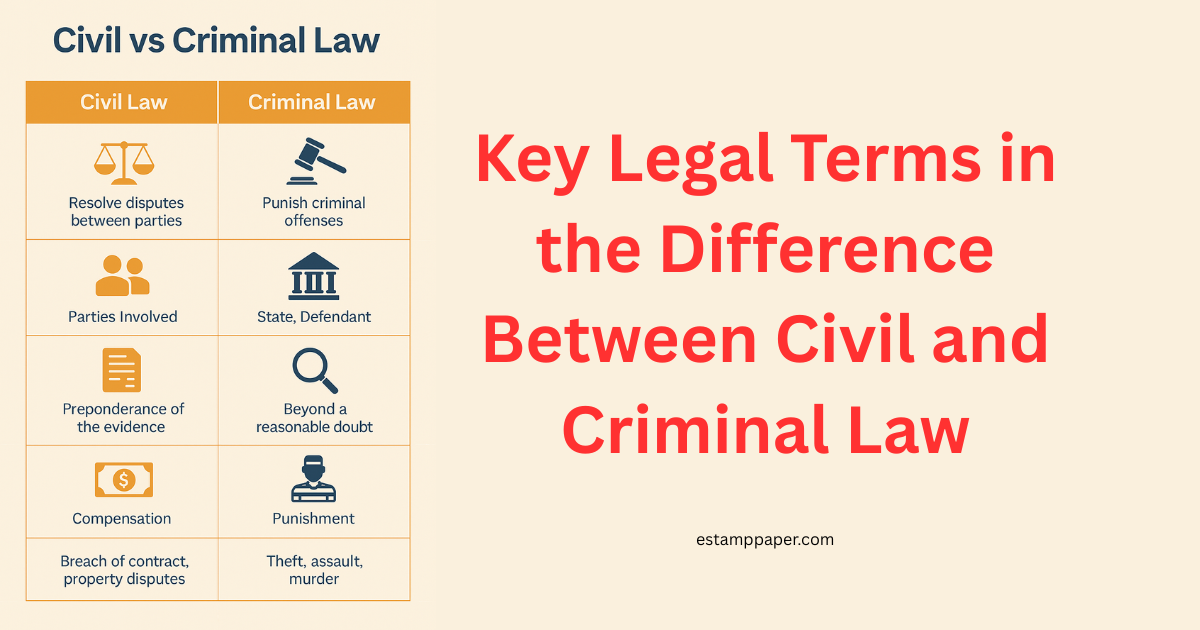A fight in which compensation is given and a fight in which punishment is given. One fight is between two people and the other fight in which the government itself is standing in front. After all, what is this web of civil and criminal law. Let’s unravel this knot today. Hello friends, you are very much welcome to the Estamp Paper blog.
We often hear in news or films that a civil case is going on or a criminal case has been filed against someone. But have you ever wondered what is the difference between these two? Why is one case called civil and the other criminal? And what is the basic difference between the two?
If you are also confused about this, then do not worry because in today’s blog we will try to understand the basic differences between civil law and criminal law in very simple language with examples. Do read the blog completely because this information is going to be useful for you.
The law is mainly divided into two branches. Civil and criminal. Let us try to understand the five main differences between these two one by one. The first and the biggest difference is the purpose. The main purpose of civil law is to resolve the dispute between two parties and protect the rights of the aggrieved party. Here the focus is on compensating the loss suffered by a party.
That is, if you suffer any loss due to a person doing some work or not doing that work despite it being his duty to do that work, then the court will ensure that you get compensation for it. These civil disputes are mostly related to property, money or a contract etc.
On the other hand, the main objective of criminal law is to punish the criminal for the crimes committed against the society. Here the focus is on punishment so that the message goes to the society that if someone commits a crime, he will be punished and this message can stop the crimes. Another big difference between both types of laws is the parties involved.
Understanding the Difference Between Civil and Criminal Law in India
Meaning, who are the parties in the case? In civil cases, the legal battle is generally between two private parties. It can be two individuals. It can be a company etc. In a civil case, the party filing the case is called the plaintiff and the party against whom the case is filed is called the defendant.
On the contrary, in a criminal case, on one side is the person who is accused of a crime and on the other side is the State itself. The main reason for the State being a party on one side in criminal matters is that the main principle behind the criminal law in our country is that any crime is considered to be committed against the State. Because it is the State’s job to establish the rule of law and whoever commits a criminal act by going against the law, his act is considered to be against the State.
Another reason behind this is that the impact of a crime is not only against a single person but against the entire society. Therefore, the police investigates the matter on behalf of the government and government lawyers fight the case. In criminal cases, the person who files the case is called the complainant and the person who is accused of the crime is called the accused. The third major difference between the two types of cases is the burden of proof.
What Is the Meaning of Burden of Proof?
First let us understand in easy language what is the meaning of burden of proof? This means which party will have the burden of proving a case in the court. There is a big difference between civil and criminal law on this basis. In civil matters, the party whose argument has more weight or in other words the party in whose favour the case seems to be slightly inclined, may get a judgment in his/her favour. And in simple words, if on the basis of your documents the court finds the probability that the matter is in your favour, then the court will give a judgment in your favour.
In civil matters, judgements are made on the basis of the proportion of probabilities. On the contrary, in criminal cases, an accused can be punished only when it is proven beyond a reasonable doubt in the court that he must have committed the crime. Understand it this way that in criminal cases, it is necessary to prove the accusation beyond a reasonable doubt.
The prosecution i.e. the government’s lawyer has to prove 99.9% that the accused has committed the crime. If the court has even the slightest doubt, the accused gets the benefit. Because in our country a principle of criminal law is that even if the guilty is acquitted, an innocent should not be punished.
After the burden of proof, the fourth major difference between civil and criminal matters is also based on the result. Because in a civil case, the remedy that the plaintiff gets after winning the case is generally in the form of compensation, possession etc. For which the court issues an executable order which is called a degree. Whereas in a criminal case, if the accused is found guilty, he gets a punishment of jail or fine or both types.
In serious cases, the culprit can be given life imprisonment or even death sentence. The fifth difference is also based on the beginning of the case. Because a civil case starts with presenting a claim. That is, to start a civil case, the plaintiff has to present a claim in the court. In which the plaintiff tells how which of his rights has been affected and how such rights have been violated by the defendant.
On the other hand, a criminal case starts on the basis of a complaint given to the police by the complainant party. The police registers such a complaint as an FIR and investigates the case and submits the investigation report to the court. After which the trial of the case takes place in the court and the case moves forward.
Examples of civil matters include property disputes, disputes between tenant and landlord, matters related to money recovery, breach of contract, matrimonial matters like divorce, etc. Criminal matters include matters like theft, robbery, assault, murder, harassment for dowry, etc. Another interesting thing is that sometimes both civil and criminal matters can be filed for the same incident.
For example, suppose an accident occurs in which someone is hit by racing driving, then firstly it is a crime for which a criminal case will be filed to punish the person doing the racing driving. Secondly, the person who is injured or who dies can file a civil case himself or if death has occurred then his heirs can also file a civil case to get compensation. So in essence, the purpose of civil law is to compensate for the loss or to get civil rights and the purpose of criminal law is to punish the criminal.
Civil cases can generally be between two private parties. Whereas in criminal cases, on one side there will be the accused party and on the other side there will be the government itself. In civil cases, the judgement in the matter can be made in one’s favour by stating possibilities in one’s favour. That is, the civil court gives judgement on the basis of possibilities and in criminal court, to get the accused declared guilty, it has to be proved beyond doubt. The result of civil cases comes in the form of compensation etc. Rather, the result of criminal cases comes in the form of punishment or acquittal.
Hopefully now you have understood the difference between civil and criminal law well. Every citizen should have this basic information about law. If you find the blog useful, share it with your friends and family so that they can also become aware. If you have any question related to law in your mind or you want a blog on any other topic, then do let us know by commenting below.
If you want to check the status of a civil or criminal case, you can use the by the Indian judiciaryStay connected with our estamppaper.com blog because knowledge of law is your biggest right. Namaskar Jai Hind.


